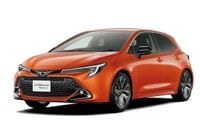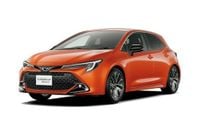Toyota Motor Corporation has taken a significant step towards sustainability by announcing the discontinuation of gasoline models for its popular Corolla series, which includes the Corolla Sport, Corolla Touring, and traditional Corolla sedan. This decision was unveiled on May 9, 2025, aligning with the company's commitment to carbon neutrality and government policies aimed at banning the sale of new gasoline vehicles by 2035.
The Corolla Sport, which is a 5-door hatchback, will no longer offer a gasoline option and will instead focus exclusively on hybrid models. This change is part of a broader strategy to enhance environmental performance and fuel efficiency across Toyota's lineup. The new Corolla Sport was released on the same day as the announcement, while the Corolla and Corolla Touring are set to hit the market on May 19, 2025.
The pricing for the Corolla series has been adjusted accordingly. The Corolla Sport is priced from 2,481,600 yen to 3,172,000 yen, while the Corolla sedan will start from 2,279,200 yen. The Corolla Touring will also follow a similar pricing structure, reflecting the enhancements made to each model.
In terms of features, Toyota has standardized several previously optional equipment items to improve the overall product appeal. The Corolla Sport's G "Z" grade will now include a front drive recorder and back guide monitor with a simple recording function, a digital key, a steering heater, and display audio plus. Meanwhile, the G grade will be equipped with a blind spot monitor, safe descent assist, and parking support brake for rear-approaching vehicles, as standard.
For the Corolla sedan, similar upgrades have been implemented. The W×B grade will also see the addition of a front drive recorder and back guide monitor, while the G grade will receive the same safety features as its hatchback counterpart. The G grade will additionally come with 205/55R16 tires, 16 x 7J aluminum wheels, and LED front fog lamps.
The shift to hybrid models across the Corolla series is part of Toyota's broader initiative to achieve carbon neutrality by 2050. The company aims to reduce carbon dioxide emissions significantly, as hybrid vehicles generally produce fewer emissions than their gasoline counterparts. This transition reflects a growing trend among automakers to prioritize sustainability in their vehicle offerings.
As Toyota continues to innovate, the Corolla series remains a cornerstone of its global strategy. Since its debut in 1966, over 50 million units of the Corolla have been sold across more than 150 countries and regions, making it one of the best-selling cars in history. The current 12th generation Corolla, launched in 2019, is designed as a global model, catering to various markets with a unified approach.
The Corolla Sport, first introduced in June 2018, has been positioned as a sporty option within the Corolla lineup. The recent improvements not only enhance its appeal but also emphasize Toyota's commitment to quality and performance. The vehicle is built on the new TNGA (Toyota New Global Architecture) GA-C platform, which allows for a more enjoyable driving experience and superior ride comfort.
With the introduction of standard equipment such as a vehicle communication device (DCM), the Corolla Sport aims to provide a connected driving experience. The body dimensions of the vehicle measure 4,375 mm in length, 1,790 mm in width, and 1,460 mm in height, with a wheelbase of 2,640 mm, ensuring a spacious interior for passengers.
In addition to improving safety features and enhancing user convenience, Toyota's latest modifications to the Corolla series are designed to bolster its competitiveness in the compact car market. The company's "group strategy" allows for the development of multiple models under the Corolla name, catering to diverse consumer preferences while maintaining a focus on sustainability.
As the automotive industry faces increasing pressure to reduce its environmental impact, Toyota's decision to phase out gasoline models in favor of hybrids demonstrates a proactive approach to meeting both consumer demand and regulatory requirements. The company is setting an example for others in the industry, showcasing how traditional manufacturers can adapt to the evolving landscape of vehicle technology and environmental responsibility.
In conclusion, the transition to hybrid models within the Corolla series marks a pivotal moment for Toyota as it embraces a more sustainable future. With improved features, competitive pricing, and a commitment to reducing emissions, the new Corolla lineup is positioned to meet the needs of modern drivers while contributing to a greener planet.





